#Tutsi genocide
Text
Macron said that France could have stopped the genocide in Rwanda in 1994, especially with the help of its African allies and its Western allies as well. But he then added that “France did not have the will/desire to do it”.
Apparently he is planning a speech on that specific subject on Sunday.
Dude needs a whole speech and so many words to say that France was an accomplice and active participant in the genocide in Rwanda? Like having the means and ability to stop a genocide but refusing to or “not having the will/desire” to stop a freaking genocide is called being a fucking accomplice.
#France#Rwanda genocide#genocide#Tutsi genocide#macron#politics#France being on the side of the genocidal maniacs as usual#it’s a French tradition at this point
56 notes
·
View notes
Text
ppl who are trying to do explainers abt current events in DRCongo are rly imo doing a massive disservice to ppls understandings without talking abt the regional context of DRCongo being where regional tensions have boiled over regularly - see Both Congo Wars - as well as putting M23 - as well as those wars - in the context of Rwandan/Burundian Genocides & the dispersion of Tutsi militias (see also: CNDP) in & around the Kivu regions since then - but also even Rwandan Hutu militias (see FDLR)
#i havent rly read enough m23 statements to rly have a good feel on their intentions#so not going to rly say whether or not genocidal is applicable#but there are also regional historical and geopolitical factors#idk rly dissatisfied w how a lot of conflicts get overly simplified like this#and reductive in just a template sorta way#like if u wanna say m23 is genocidal and if this is all just a hamfisted abstraction of israel#one might think theres a potent point to be made with rwandan/Tutsi genocide victims becoming genocidaires#the fact i havent seen a single person make that analogy rly highlights how surface level this all is#like even if idk if i agree w the analogy at least it betrays context awareness#also potent historical point of comparison in drcongo itself w european backing of the katanga crisis#had a post like 6 months ago w more contextualizing the conflict re: congo wars i should try and find it#like. if you wanna talk about complex politics congos much much more complex than israel-palestine
48 notes
·
View notes
Text
youtube
Rwanda: From colonialism to genocide
(Matthias Frickel | 04/02/2024)
The DW documentary "Reclaiming History — Colonialism and the Genocide in Rwanda" traces the arc from German colonial rule to the genocide in Rwanda.
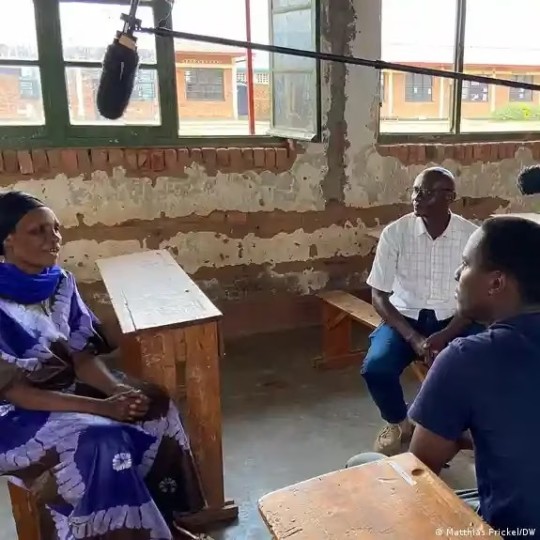
Ishimwe interviewed surviving members of his family for the documentary. Image: Matthias Frickel/DW
The DW documentary "Reclaiming History — Colonialism and the Genocide in Rwanda" is the first to examine the role played by German and Belgian colonialism in the 1994 genocide against the Tutsi in Rwanda. Rwandan director Samuel Ishimwe, whose parents were murdered in the genocide, sets out in search of the origins of the "racial hatred" between Tutsi and Hutu. The 86-minute documentary will be broadcast on DW's worldwide linear program and available for streaming on DW Documentaries' YouTube channels starting April 5, 2024.
Sowing the seeds of hatred
"If we speak the same language, share the same culture, same country, how did we become different?" It is this fundamental question that drives Samuel Ishimwe, filmmaker from Rwanda and winner of a Silver Bear at the 2018 Berlin International Film Festival. How was hatred sown in Rwanda? By whom? In 100 days from April 1994, some one million people were brutally murdered, including Ishimwe's parents and most of his family.
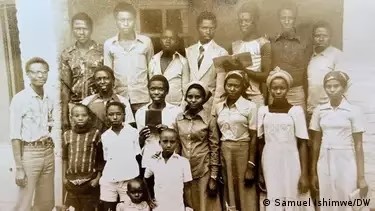
Filmmaker Samual Ishimwe's family, before the 1994 genocide killed all but two of them. Image: Samuel Ishimwe/DW
The fact that he is now investigating the question of "why" on behalf of a German broadcaster is particularly significant for him. Scientific findings show that Germany, as the first colonial power, had already divided Rwandans into different "races” at the end of the 19th century. Were the seeds for the later killings sown here? In the 1994 genocide against the Tutsi, Hutu militias killed their neighbors because they believed propaganda that the Tutsi minority were not human.
Tracing history in Rwanda, Germany and Belgium
DW director Matthias Frickel accompanies Samuel Ishimwe on his journey through Rwanda, Germany and Belgium, where historians and contemporary witnesses help him get to the bottom of both his story and that of his country. For example, Romeo Dallaire, former head of the United Nations blue helmet force in Rwanda, relates how he had to watch the Western world allow the killings to take place in 1994, despite his tireless warnings.
[Keep reading]
#Rwanda#genocide#1994#1990s#Germany#Belgium#colonialism#German history#Belgian history#dehumanization#Hutu#Tutsi minority#Samuel Ishimwe#Matthias Frickel#Youtube
8 notes
·
View notes
Text
“There has long been a tendency in some intellectual circles to believe that the justice of a cause must be proportional to the lengths that people are willing to go to promote it. Only very desperate people, the argument goes, would do such things; therefore, since they do such things, they must be desperate.
The truth is otherwise. As one of the most efficient genocides in history-that of the Tutsi in Rwanda in 1994-proved, genocide can be fun. People in Rwanda hunted and killed their neighbors and then spent the evenings celebrating, feasting, singing, and dancing. They were happy with their day's work and couldn't wait to resume it. In fact, it was the time of their lives.
Intellectual support in the West for the Soviet Union was at its height when the regime was at its worst. Its atrocities were known and obvious. It was only when the Soviet Union moderated its repression and seemed to have lost the courage of its brutality that support for it in the West waned. Moscow was no longer a model for intellectuals that they deemed worthy of imitation once they had attained power. It had become grey and banal rather than vivid, exciting, and experimentally utopian.”
//Theodore Dalrymple
#violent Utopianism#communism#intellectuals#Theodore Dalrymple#human nature#desperate people#Tutsi#self justified#history#genocide#rwanda#causes#Soviet Union#utopianism
12 notes
·
View notes
Text
4 notes
·
View notes
Text
Ensure that such an atrocity can never happen again – in Rwanda or elsewhere.
‘Remember’ is a translation of Kwibuka in Kinyarwanda, Rwanda’s national language. It describes the annual commemoration of the 1994 Genocide against the Tutsi.
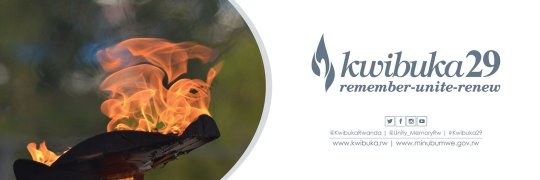
Kwibuka is also a time to learn about Rwanda’s story of reconciliation and nation building. The national commemoration of the genocide begins on 7 April every year.
#International Day of Reflection on the 1994 Genocide against the Tutsi in Rwanda#Kwibuka29#Prevent Genocide#Remember-Unite-Renew#7 april
7 notes
·
View notes
Text
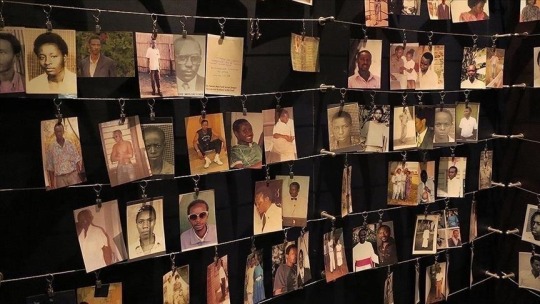
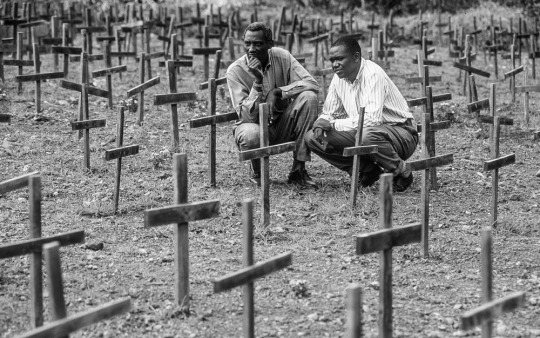
Rwandan genocide
The 1994 Rwandan genocide was another disappointing case of how toxic tribalism can lead to death of many citizens by the hand of their fellow countrymen. During this genocide the Hutu tribe massacred people from the Tutsi tribe and in just 100 days about 800,00 people were slaughtered.
Lists of government opponents were handed out to militias who went and killed them, along with all of their families. Neighbors killed neighbors and some husbands even killed their Tutsi wives. Thousands of Tutsi women were also taken away and kept as sex slaves. Tutsi citizens were quite literally butchered as many were murdered by the "weapon of choice" which was a machete.
The western world had turned there back on the Tutsi as the UN and Belgium had forces in Rwanda but the UN mission was not given a mandate to stop the killing. A year after US troops were killed in Somalia, the US was determined not to get involved in another African conflict. The Belgians and most UN peacekeepers pulled out after 10 Belgian soldiers were killed. The French, who were allies of the Hutu government, sent a special force to evacuate their citizens and later set up a supposedly safe zone but were accused of not doing enough to stop the slaughter in that area.
The story of the Rwandan genocide was perfectly depicted in the movie (Hotel Rwanda-2004).
•••
Genocidio de Ruanda
El genocidio de Ruanda de el año 1994, fue otro caso decepcionante de como el tribalismo tóxico puede llevar a la muerte de muchos ciudadanos a manos de sus compatriotas. Durante este genocidio, la tribu Hutu masacró a las personas de la tribu Tutsi y en tan solo cien días, alrededor de ochocientas mil personas fueron masacradas.
A las milicias se les entregaron listas de los opositores del gobierno, fueron y los mataron junto con todos sus familiares. Habían vecinos que mataban a sus vecinos, y algunos esposos mataban a sus esposas Tutsi. Miles de mujeres Tutsi fueron secuestradas y las mantenían como esclavas sexuales. Los Tutsi fueron masacrados, muchos fueron asesinados con un “arma de preferencia”, la cual era un machete.
El mundo occidental le había dado la espalda a los Tutsi, ya que la ONU y Bélgica tenían tropas en Ruanda, pero la misión de la ONU no recibió mandato para detener las matanzas. Un año después de que las tropas estadunidenses murieran en Somalia, Estados Unidos estaba decidido a no involucrarse en otro conflicto africano. Los belgas y la mayoría de los conciliadores de la ONU se retiraron después de la muerte de diez soldados belgas. Los franceses que eran aliados del gobierno Hutu, enviaron a una fuerza especial para evacuar a sus ciudadanos y luego establecieron una zona “supuestamente segura”, pero fueron acusados de no hacer lo suficiente para detener las matanzas en la zona.
La historia del genocidio de Ruanda quedó perfectamente representada en la película (Hotel Ruanda-2004).
#blacklivesmatter#blacklivesalwaysmatter#history#blackhistory#culture#blackhistorymonth#knowyourhistory#rwanda#genocide#dontforget#follow#read#share#reblog#blackpeoplematter#tutsi#hutu#tribes#english#spanish#learn#newpost#africa#like#short reads#black children matter#black women matter#historyfacts#blackmenmatter
23 notes
·
View notes
Text
‘They Stopped Seeing Us As Human Beings’: How War Criminal Europe Provoked A Savage Modern Genocide In The Heart of Africa
Thirty Years Later, The Rwandan Genocide Reminds Africa That It Needs African Solutions To African Problems
— March 7, 2024 | RT
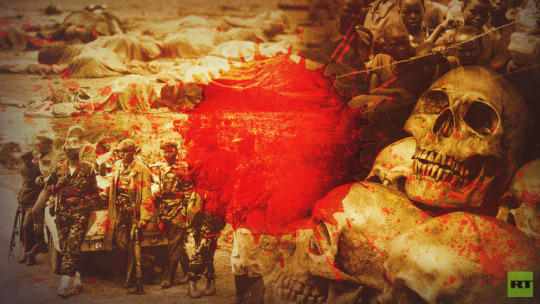
© RT/RT
“Our neighbors moved away from us, and we found ourselves isolated. They called us snakes. They stopped seeing us as human beings. Only a handful of neighbors came to drink at the bar I ran, the biggest bar in the area,” Dafrosa, a survivor of the 1994 genocide, recalls. “Markets and shops appeared where we were forbidden to shop. There they refused to sell us food; the cashiers said, ‘take your money somewhere else.’ From 1990 to 1994, politics began to divide people more and more. Segregation became commonplace. At first, there was no hostility in our church, but in other churches, the parishioners were divided and even refused to give communion to the Tutsis.”
The horrific events of April 1994 put an end to the illusion that the end of the Cold War and the ‘democratization’ of Africa would lead to years of peace and prosperity.
RT recalls how the bloody genocide began in Rwanda and whether it was possible to avoid.
How It Started
On April 6, 1994, two surface-to-air missiles shot down a plane as it approached Kigali, the capital of Rwanda. Then-President of Rwanda Juvenal Habyarimana and President of Burundi Cyprien Ntaryamira, on their way from peace talks in Arusha, Tanzania, died in the plane crash, along with seven other passengers.
The military, headed by retired Chief of Staff Theoneste Bagosora convened an interim government and declared that the Rwandan Patriotic Front (RPF) headed by Paul Kagame had been responsible for the attack. By that time, the RPF had been engaged in an armed conflict with the government for many years, and advanced towards the capital from the side of Uganda.
On that tragic night, Bagosora at a meeting of the General Staff of the Army tried to negotiate a transfer of power to the military but faced opposition from Romeo Dallaire who led the United Nations Assistance Mission for Rwanda (UNAMIR) at that time.
First of all, the conspirators got rid of moderate politicians. Among the victims were Prime Minister Agathe Uvilinhiyimana, Chairman of the Constitutional Court Joseph Kavaruganda, as well as a number of ministers and leaders of opposition parties. Their assassination greatly undermined any resistance efforts. Bagosora’s call for ‘revenge’ was supported by commanders, local authorities, and political experts, and was broadcast on Radio Television Libre des Mille Collines (RTLM) and other media.
100 Days of Genocide
Mass killings began in Rwanda’s Gisenyi Province (considered a stronghold of the authorities) just a few hours after the plane crash. By the next day, they spread to six more provinces, including the capital. The Presidential Guard, gendarmerie, Interahamwe youth detachments (‘interahamwe’ translates from Kinyarwanda as ‘those who work/fight together’), and ordinary people grabbed machete blades and agricultural tools, and wiped out the ‘Tutsis’, identified through documents or pointed out by their neighbors.
The wave of deadly violence began to decline as the RPF seized new territories in the north and east of Rwanda. In May and June 1994, the genocide continued on the territory which was not controlled by the RPF, while most of the intended victims had already been killed, the officials tried to direct the violence into the fight against Kagame’s detachments.
The mass murder of unarmed people went on throughout the country for about three months, leading to the death of several hundred thousand people. Though estimates vary depending on the time frame and other criteria, according to the Government of Rwanda, the official death toll is 1,074,107. The international community and the UN contingent stationed in Rwanda could not agree on any effective measures and merely watched the tragedy unfold.
During the about 100-day genocide, the RPF’s struggle with Habyarimana’s regime continued, and so did the conflict within the ruling regime – between supporters of the “moderate” course and the “radicals” led by Bagosora, who rejected any negotiations with the RPF. The genocide was eventually stopped, RPF troops led by Kagame entered the capital. From then and for many years, the RPF established itself as the undisputed ruling party in Rwanda, and the key partner for any external player in the region.
In the aftermath of the tragic events of 1994, Rwanda was devastated, its GDP plunged dramatically, and the political landscape in the African Great Lakes region changed completely.
The genocide was not initially planned as a full-scale elimination of all Tutsis, but as a political cleansing of the actual or potential opponents of the regime. However, this got out of control promptly and dramatically.
The Role of War Criminal France
It is a widely reported that France maintained close relations with the Rwandan officials, responsible for the genocide, right up to its culmination. Many Rwandans even believe that, in the summer of 1994, a limited contingent of French troops was sent to the country in order to help France’s close allies among the government officials to escape (Opération Turquoise).
Having come to power, Paul Kagame reduced the influence of France in his country to a minimum. On the official level, Rwanda abandoned the use of the French language and switched to English. It also joined the Commonwealth of Nations headed by Britain. In its first years, Kagame’s government received major support from the US, but later, driven by both historical and economic reasons, Rwanda formed a multi-vector partnership system that was increasingly oriented towards the East – for example, China and the UAE.
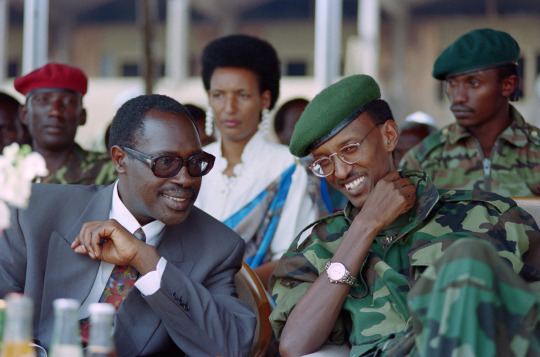
Rwanda's new elected Hutu President Pasteur Bizimungu (L) and his vice President Paul Kagame, the Tutsi-led RPF (Rwandan Patriotic Front) commander (R), share a joke in Kigali on July 19, 1994. © Alexander Joe/AFP
Where The ‘Tutsis’ and ‘Hutus’ Came From
It is often claimed that the ‘Tutsis’ and ‘Hutus’ are ethnic groups. This is not at all the case, since the differences between these imposed and outdated categories are rather social. The Tutsis and Hutus, — at the time these categories were in use, — spoke the same language and inhabited the same territory. They were historically part of one society and closely interacted with each other.
In modern-day Rwanda, division into ‘Tutsis’ and ‘Hutus’ is wisely abandoned and forbidden – all residents are Rwandans, and the descendants of the former Hutus and Tutsis get along very well. But this does not mean that these categories could not be reinstated in the future, should someone want to start another conflict.
Binary oppositions were always an important factor in the development of European culture. But in traditional African societies, hybrid identity was much more widespread – a person is often identified with several social and cultural groups, and the social structure allowed people to ‘switch’ their social identity multiple times in the course of life.
The ‘Tutsis’ and ‘Hutus’ became known as a result of complex overlapping processes, including migration, assimilation, and the division of labor in society. The ‘Tutsis’ owned cattle, and generally had bigger incomes and more weapons. The ‘Hutus’ people worked the land. In pre-colonial Rwandan society, the ‘Tutsis’ represented the traditional hereditary aristocracy. Both groups spoke the same language, their traditions and customs were part of a single culture. The cultural boundaries were often blurred, and this served as an antidote to conflicts.
For example, a member of the ‘Tutsi’ community could become a ‘Hutu’, and vice versa. Some people weren’t part of either group, or considered themselves members of both groups. In European terms, they were one nation, but represented different social groups.
However, German and later Belgian colonialists needed a way to effectively manage and control the population of Ruanda-Urundi (the colonial territory that preceded modern Rwanda and Burundi), particularly since the Europeans were few in number. Searching for a model of colonial governance, they resorted to racial theoriespopular in Europe at the time (and not just in Germany). Based on these groundless theories, the taller ‘Tutsis’, who allegedly came from the north, were innately superior to the thickset ‘Hutus’.
The genocide was not an accident nor a sudden, unforeseen event. It was a deliberate terror campaign directed against the assumed supporters of the RPF. By April 1994, this campaign had reached its apogee and resulted in deliberately organized mass killings of unarmed people.
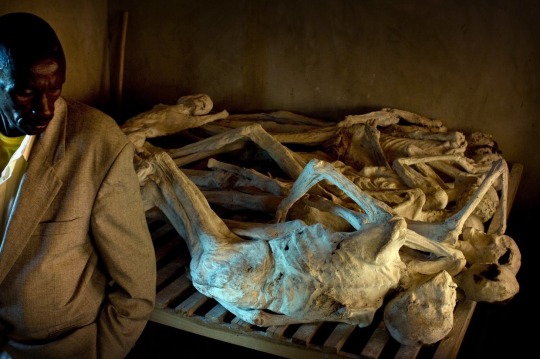
Bodies dug out from mass graves laid on a table in the Murambi memorial center in the south of Rwanda, April 19, 2008 in Murambi, Rwanda. © Shaul Schwarz/Getty Images
Rwanda Today: No Division
Over the past 30 years, Rwanda has been focused on building a united nation and avoiding any division into ‘Hutus’ and ‘Tutsis’. Progress in this respect is evident – the country has risen from the ashes, ensured sustainable economic growth, and turned into a regional stronghold of stability and security.
However, the opposition between the ‘Hutus’ and ‘Tutsis’ persists around. In Burundi, the percentage of Hutus and Tutsis in leadership positions is fixed at legislative level. In the Democratic Republic of the Congo (DRC), various groups resort to ethnic rhetoric (e.g. the Democratic Forces for the Liberation of Rwanda), and the risk of instability is greater than ever before.
Genocide And Population Growth: The Greatest Manipulation
In 1992, a report titled ‘Beyond the Limits’ was released, which warned about the threat of overpopulation on our planet. The report was published by the Club of Rome – one of the most influential behind-the-scenes non-profit organizations, notorious for its struggle with overpopulation. From an informational and ideological point of view, the report has strongly influenced how conflicts in Africa (including those in Rwanda) are viewed by the world.
The massive, months-long massacre, in the course of which ordinary people killed their unarmed neighbors practically with their bare hands, seemed to illustrate the horror into which the planet could plunge as a result of overpopulation and a lack of land, resources, and food. Several authoritative articles and monographs published in Europe and the US convinced the world that the tragedy in Rwanda had happened precisely because of overpopulation.
From this, an obvious conclusion was drawn that birth rates in the Global South – from Latin America to China – must be limited in order to avoid the repetition of the Rwanda scenario in countries like Nigeria or China. In reality, the Club of Rome and certain Western elites came to this conclusion in the interests of preserving their global supremacy and preventing the transfer of power to the world majority in the East and South. After all, the rise of the West to power and colonial expansion would have been impossible without the ‘demographic explosion’ that had once happened in Europe.
The myth about the overpopulation of Earth, including the ‘population trap’ and the food-shortage trap that humanity can fall into, is among the biggest information manipulations of the late 20th century. It has been based on a considerable number of ‘expert’ reports and scientific papers, publications, and discussions. However, by the second decade of the 21st century, it became clear that reality was a lot more complicated, and demographic growth in countries such as China, India, Ethiopia, and Nigeria actually ensured the development of infrastructure, agriculture, and allowed these countries to eliminate hunger. Today, all this is obvious, but in 1994, the genocide in Rwanda seemingly proved the opposite: that global overpopulation leads to catastrophes.
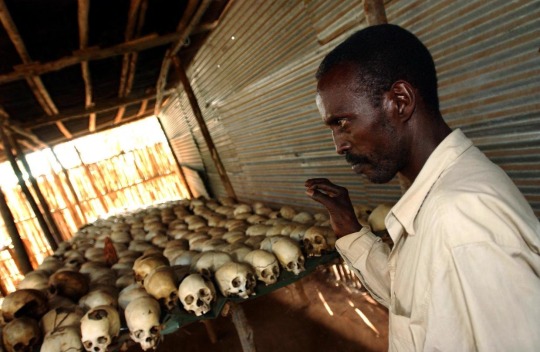
Pacifique Rutaganda, the guide of the Ntarama Genocide memorial where 5000 people were killed in the 94 Genocide, talks to an AFP reporter 26 May 2003. © Marco Longari/AFP
Thirty years have passed since the Rwanda genocide. Following a significant population decrease – from seven million people in the late 1980s to five million by the end of 1994 – by now, the population of Rwanda has surged to 14 million. Rwanda remains the most populous country in continental Africa, and is also one of the leaders in terms of economic growth. In terms of population density in Africa, Rwanda is surpassed only by Mauritius – which could well be the most prosperous country on the African continent.
Economic Growth Today
The supposed connection between population density, falling living standards, and food crises in Africa was merely an unsuccessful hypothesis. The expected growth of Africa’s population to three billion people in the coming decades is likely to solve the problem of hunger through market growth, infrastructure development, and agricultural production.
In Rwanda itself, economic growth is evident. In the past 30 years, crop production has increased more than sixfold, both due to increased agricultural productivity and because of new land included in agricultural turnover.
The length of paved roads has doubled to 1,200 km, exports increased from $100 million to $3 billion, and the capacity of power plants has increased sevenfold to 230 MWh. The growth of the Rwandan economy isn’t just a result of the balanced development of infrastructure, but is also due to the consistent development of the tertiary sector of the economy. In 2022, Rwanda’s tourism revenues amounted to $445 million. An important contribution in this regard is made by RwandAir, which offers 24 direct routes to 21 countries.
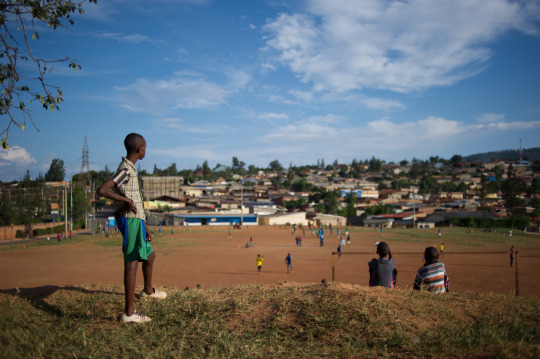
Rwandan youths watch a football game on March 16, 2014 at Gikondo suburb in the capital, Kigali. © Phil Moore/AFP
Why Did It Happen?
As for the causes of the genocide, we can now affirm that it was caused by external and situational factors. The electoral ‘democracy’imposed by France did not take into account the country’s traditions of governance and the class structure of Rwandan society.
The criminals who came to power united their supporters under the guise of protecting the interests of the ‘Hutus’, and incited people to violence, which was driven by induced class hatred. Meanwhile, external forces, including arms suppliers and smugglers, made money from the conflict. It was also convenient for the West as a means to justify its agenda and maintain its leadership position. Nevertheless, France was badly affected by the Rwanda genocide. In fact, the demise of Francafrique and the crisis in relations between Paris and Africa that has reached its apogee today, dates back to 1994.
What’s Next: Regional Hubs, Polarless Policy, External Impact
It is common practice for countries (and not just in Africa) to move their capital cities inland, away from coastal areas. In Africa, the most successful example of this is Abuja in Nigeria, and Dodoma in Tanzania may be next. This step signifies a change in the country’s system of development, as it moves away from a semi-colonial structure – when the country’s life depends on trade with the outside world through one or two large ports – to self-sufficiency ensured by internal growth resources and intraregional cooperation.
The next step is the formation of regional integration hubs in the inland parts of Africa, which would serve the needs of the entire continent. Such hubs are very important for the continent’s future. Rwanda is already turning into a remote communications and logistics center for Africa, and a distribution hub for the entire African Great Lakes region.
The construction of a new airport in southern Rwanda in partnership with Qatar Airways, and the construction of the Kigali dry port with DP World – a Dubai-based infrastructure and logistics company – can turn Kigali into an important transport hub and business center. However, the volume of foreign-exchange earnings is still insufficient to ensure the country’s continuous and rapid growth, and this remains a problem.
However, the part of the economy related to the processing and re-export of minerals from the DRC, as well as the supply of necessary goods (e.g. energy, food, medicines, and equipment) to the Eastern Congo market may ensure long-term growth, considering the growing global demand for Congolese metals. In order for this to happen, Rwanda needs to preserve a porous border with the DRC and expand its economic and political influence in North and South Kivu provinces. Peace – or at least keeping the conflicts in this part of Africa under control – is also an important prerequisite.
Among other things, Rwanda remains a positive example of a multi-vector and polarless policy characteristic of Africa. Qatar and the UAE are now forced to compete for Kigali’s attention. Even France, despite the painful history of relations between the two countries, remains among Kigali’s partners. Rwanda also maintains smooth, friendly political relations with the US, China, and Russia.
If it were not for external pressure on the DRC and Western attempts to limit China’s influence in Africa, the neighboring countries would certainly come to an agreement. Objectively, the DRC is interested in economic growth and development in its eastern regions, which would be impossible without Rwanda’s involvement. However, in recent years the conflict between Kinshasa and Kigali has escalated, acquiring sinister features which bring to mind the situation 30 years ago.
Statements by Western governments, which take an increasingly pro-Congolese stance, make the authorities in Rwanda nervous and contribute to the escalation. Nevertheless, for both Kinshasa and Kigali, it is more profitable to keep Goma (a city in the eastern region of the Congo) as a trading hub and logistics center, rather than turn it into a site of bloody battles. The tragic story of the Rwandan genocide demonstrates that the less external forces meddle in the region’s affairs, the greater its chance of living in peace and focus on development.
In July 2024, Rwanda will hold presidential elections. If the current president, Paul Kagame, is to be re-elected for another seven-year term, he will have to once again prove the effectiveness of the country’s post-1994 management model.
— By Andrey Maslov and Angelina Pshenichnikova, Center for African Studies at the Higher School of Economics, Moscow. The authors thank Daniil Makukhin and Vsevolod Sviridov from HSE for their help in preparing the article
#Africa#Feature#War Criminal 🇪🇺#Moder Genocide#The Rwandan Genocide#African Solutions | African Problems#War Criminal France 🇫🇷#Tutsis’ and ‘Hutus’#Genocide | Population | Manipulation#Economic Growth
0 notes
Text
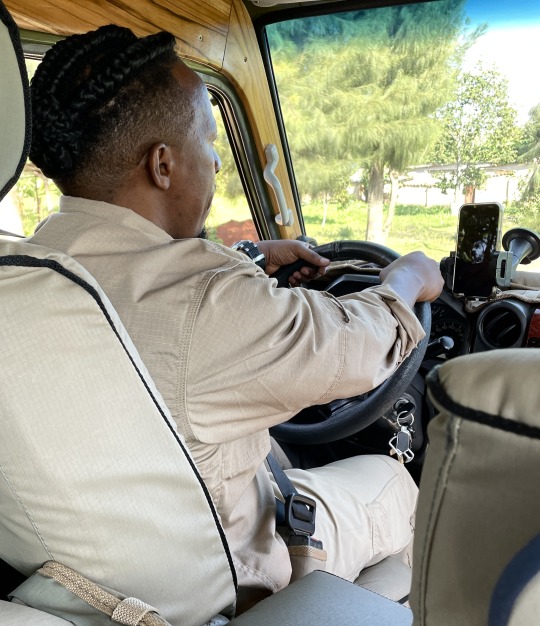
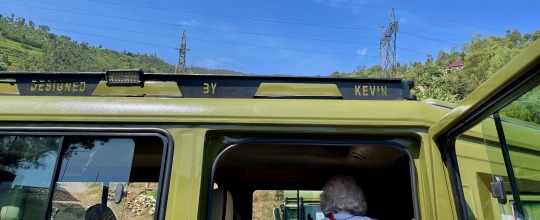
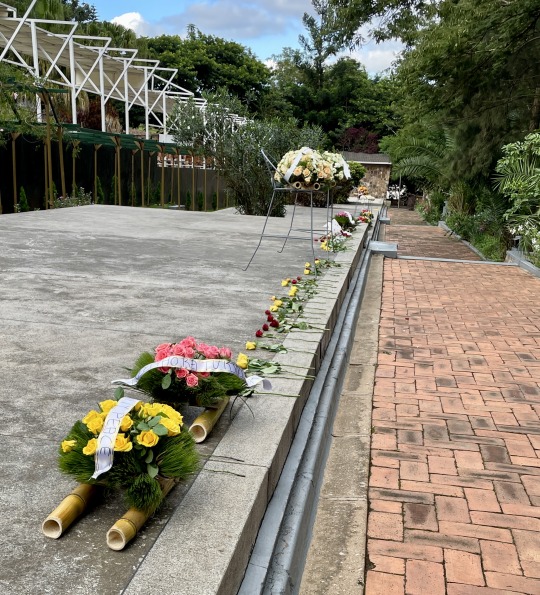
Our jeep driver Kevin told us we can share his story. During the slaughter of the Tutsi tribe by Hutu extremists, five members of Kevin's family were killed by a man they all knew. He almost killed Kevin too. Since then, Kevin has forgiven that man. With the help of a Tutsi leader who stopped the genocide and became president, Rwanda now has pride of place and respect for all, if you can imagine that. Outside of the Kigali Genocide Memorial are collective graves where 250,000 people are buried. Most of them are identified by plaques near the graves. Families and friends leave flowers in remembrance.
0 notes
Text
The Rwanda Genocide - an African Holocaust
Read the latest LOST IN HISTORY post on the Rwanda Genocide.
Rwanda Genocide Mass Grave in Kigali, 1994
We rarely think of “Genocide” as a modern event. It’s what happened to the Armenians in World War I at the hands of the Turks, and the Jewish Holocaust in World War II at the hands of the Nazis. But the Rwanda Genocide happened just 25 years ago. In 1994, in just 100 gruesome days, nearly 1,000,000 Rwandans were slaughtered by ethnic Hutu extremists.…
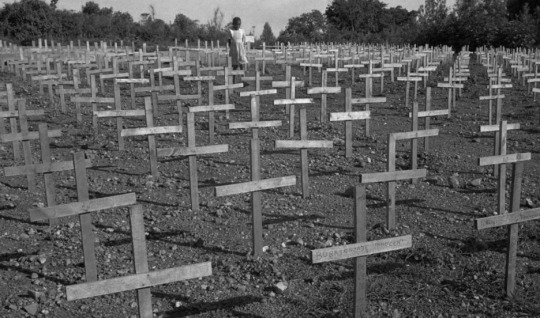
View On WordPress
0 notes
Video
youtube
What caused the Rwandan Genocide? - Susanne Buckley-Zistel
#youtube#rwanda#africa#genocide#hutu#tutsi#war#occupation#apartheid#white supremisist#colonialism#embargo#accountability#united states#european union#united nations#class war#rebels#international#international relations#complex
0 notes
Text
1994 Rwandan Genocide
1994 Rwandan Genocide was caused by multiple factors, which include the rise of its population, lack of food supply, lack of prospects for men
The Rwanda genocide, which took place in 1994, was caused by multiple factors, which include the rise of its population, lack of food supply, lack of prospects for men aged in their 20s and the lack of land available for young men to start families.
This led to this genocide for multiple reasons, not just the ethnic tensions between the Hutus, who made up 85% of the population, and the minority…

View On WordPress
0 notes
Text
The director of the New York Office of the High Commissioner for Human Rights of the UN (UN OHCHR), Craig Mokhiber, has resigned in a letter dated 28 October 2023
the resignation letter can be found embedded in this tweet by Rami Atari (@.Raminho) dated 31 October 2023.
The letters are here:
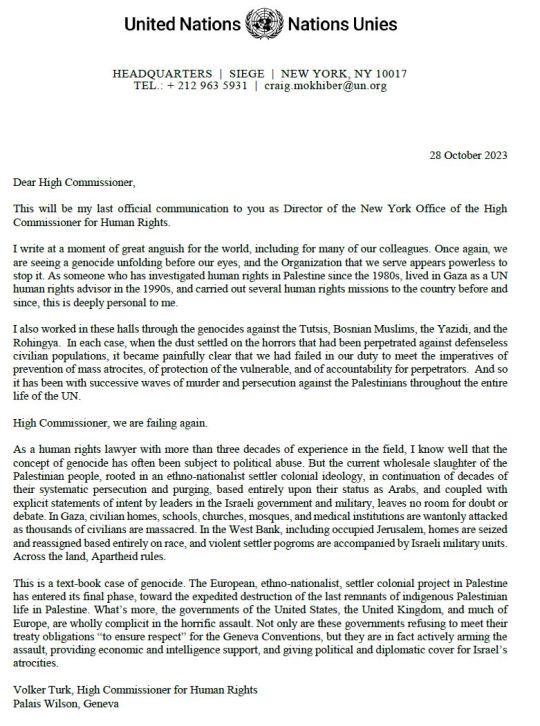
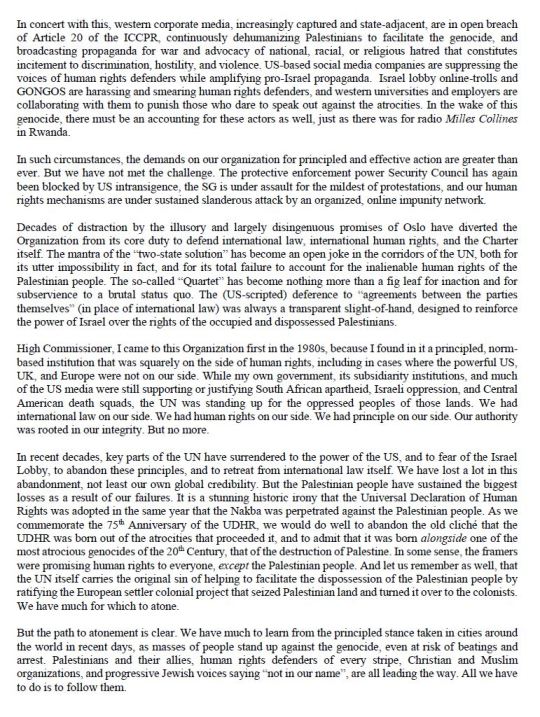
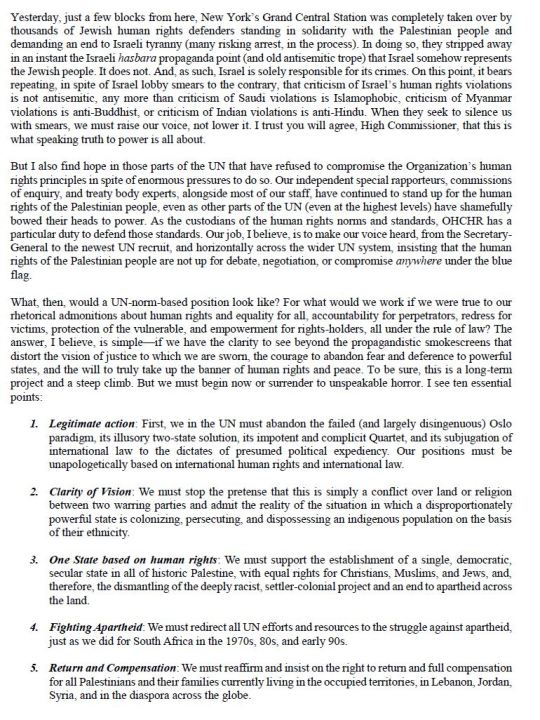
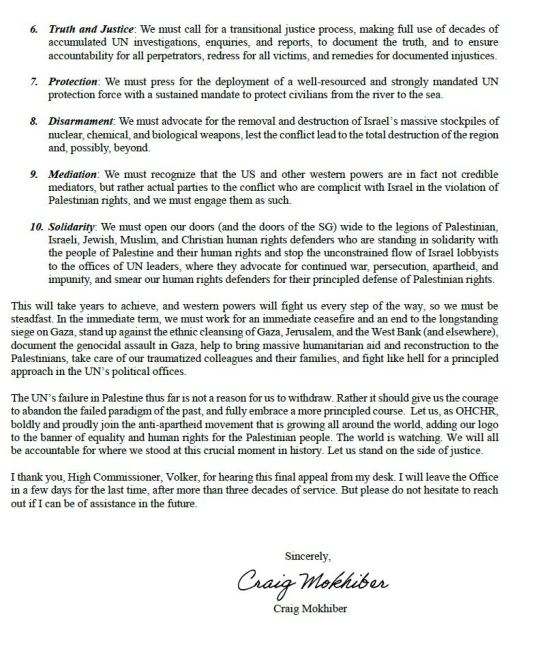
Transcription:
United Nations | Nations Unies
HEADQUARTERS I SIEGE I NEW YORK, NY 10017
28 October 2023
Dear High Commissioner,
This will be my last official communication to you as Director of the New York Office of the High Commissioner for Human Rights.
I write at a moment of great anguish for the world, including for many of our colleagues. Once again, we are seeing a genocide unfolding before our eyes, and the Organization that we serve appears powerless to stop it. As someone who has investigated human rights in Palestine since the 1980s, lived in Gaza as a UN human rights advisor in the 1990s, and carried out several human rights missions to the country before and since, this is deeply personal to me.
I also worked in these halls through the genocides against the Tutsis, Bosnian Muslims, the Yazidi, and the Rohingya. In each case, when the dust settled on the horrors that had been perpetrated against defenseless civilian populations, it became painfully clear that we had failed in our duty to meet the imperatives of prevention of mass atrocites, of protection of the vulnerable, and of accountability for perpetrators. And so it has been with successive waves of murder and persecution against the Palestinians throughout the entire life of the UN.
High Commissioner, we are failing again.
As a human rights lawyer with more than three decades of experience in the field, I know well that the concept of genocide has often been subject to political abuse. But the current wholesale slaughter of the Palestinian people, rooted in an ethno-nationalist settler colonial ideology, in continuation of decades of their systematic persecution and purging, based entirely upon their status as Arabs, and coupled with explicit statements of intent by leaders in the Israeli government and military, leaves no room for doubt or debate. In Gaza, civilian homes, schools, churches, mosques, and medical institutions are wantonly attacked as thousands of civilians are massacred. In the West Bank, including occupied Jerusalem, homes are seized and reassigned based entirely on race, and violent settler pogroms are accompanied by Israeli military units. Across the land, Apartheid rules.
This is a text-book case of genocide. The European, ethno-nationalist, settler colonial project in Palestine has entered its final phase, toward the expedited destruction of the last remnants of indigenous Palestinian life in Palestine. What's more, the governments of the United States, the United Kingdom, and much of Europe, are wholly complicit in the horrific assault. Not only are these governments refusing to meet their treaty obligations "to ensure respect" for the Geneva Conventions, but they are in fact actively arming the assault, providing economic and intelligence support, and giving political and diplomatic cover for Israel's atrocities.
Volker Turk, High Commissioner for Human Rights Palais Wilson, Geneva
In concert with this, western corporate media, increasingly captured and state-adjacent, are in open breach of Article 20 of the ICCPR, continuously dehumanizing Palestinians to facilitate the genocide, and broadcasting propaganda for war and advocacy of national, racial, or religious hatred that constitutes incitement to discrimination, hostility, and violence. US-based social media companies are suppressing the voices of human rights defenders while amplifying pro-Israel propaganda. Israel lobby online-trolls and GONGOS are harassing and smearing human rights defenders, and western universities and employers are collaborating with them to punish those who dare to speak out against the atrocities. In the wake of this genocide, there must be an accounting for these actors as well, just as there was for radio Mules Collins in Rwanda.
In such circumstances, the demands on our organization for principled and effective action are greater than ever. But we phave not met the challenge. The protective enforcement power Security Council has again been blocked by US intransigence, the SG [UN Secretary General] is under assault for the mildest of protestations, and our human rights mechanisms are under sustained slanderous attack by an organized, online impunity network.
Decades of distraction by the illusory and largely disingenuous promises of Oslo have diverted the Organization from its core duty to defend international law, international human rights, and the Charter itself. The mantra of the "two-state solution" has become an open joke in the corridors of the UN, both for its utter impossibility in fact, and for its total failure to account for the inalienable human rights of the Palestinian people. The so-called "Quartet" has become nothing more than a fig leaf for inaction and for subservience to a brutal status quo. The (US-scripted) deference to "agreements between the parties themselves" (in place of international law) was always a transparent slight-of-hand, designed to reinforce the power of Israel over the rights of the occupied and dispossessed Palestinians.
High Commissioner, I came to this Organization first in the 1980s, because I found in it a principled, norm-based institution that was squarely on the side of human rights, including in cases where the powerful US, UK, and Europe were not on our side. While my own government, its subsidiarity institutions, and much of the US media were still supporting or justifying South African apartheid, Israeli oppression, and Central American death squads, the UN was standing up for the oppressed peoples of those lands. We had international law on our side. We had human rights on our side. We had principle on our side. Our authority was rooted in our integrity. But no more.
In recent decades, key parts of the UN have surrendered to the power of the US, and to fear of the Israel Lobby, to abandon these principles, and to retreat from international law itself. We have lost a lot in this abandonment, not least our own global credibility. But the Palestinian people have sustained the biggest losses as a result of our failures. It is a stunning historic irony that the Universal Declaration of Human Rights was adopted in the same year that the Nakba was perpetrated against the Palestinian people. As we commemorate the 75th Anniversary of the UDHR, we would do well to abandon the old cliché that the UDHR was born out of the atrocities that proceeded it, and to admit that it was born alongside one of the most atrocious genocides of the 20th Century, that of the destruction of Palestine. In some sense, the framers were promising human rights to everyone, except the Palestinian people. And let us remember as well, that the UN itself carries the original sin of helping to facilitate the dispossession of the Palestinian people by ratifying the European settler colonial project that seized Palestinian land and turned it over to the colonists. We have much for which to atone.
But the path to atonement is clear. We have much to learn from the principled stance taken in cities around the world in recent days, as masses of people stand up against the genocide, even at risk of beatings and arrest. Palestinians and their allies, human rights defenders of every stripe, Christian and Muslim organizations, and progressive Jewish voices saying "not in our name", are all leading the way. All we have to do is to follow them.
Yesterday, just a few blocks from here, New York's Grand Central Station was completely taken over by thousands of Jewish human rights defenders standing in solidarity with the Palestinian people and demanding an end to Israeli tyranny (many risking arrest, in the process). In doing so, they stripped away in an instant the Israeli hasbara propaganda point (and old antisemitic trope) that Israel somehow represents the Jewish people. It does not. And, as such, Israel is solely responsible for its crimes. On this point, it bears repeating, in spite of Israel lobby smears to the contrary, that criticism of Israel's human rights violations is not antisemitic, any more than criticism of Saudi violations is Islamophobic, criticism of Myanmar violations is anti-Buddhist, or criticism of Indian violations is anti-Hindu. When they seek to silence us with smears, we must raise our voice, not lower it. I trust you will agree, High Commissioner, that this is what speaking truth to power is all about.
But I also find hope in those parts of the UN that have refused to compromise the Organization's human rights principles in spite of enormous pressures to do so. Our independent special rapporteurs, commissions of enquiry, and treaty body experts, alongside most of our staff, have continued to stand up for the human rights of the Palestinian people, even as other parts of the UN (even at the highest levels) have shamefully bowed their heads to power. As the custodians of the human rights norms and standards, OHCHR. has a particular duty to defend those standards. Our job, I believe, is to make our voice heard, from the Secretary-General to the newest UN recruit, and horizontally across the wider UN system, incisting that the human rights of the Palestinian people are not up for debate, negotiation, or compromise anywhere under the blue flag.
What, then, would a UN-norm-based position look like? For what would we work if we were true to our rhetorical admonitions about human rights and equality for all, accountability for perpetrators, redress for victims, protection of the vulnerable, and empowerment for rights-holders, all under the rule of law? The answer, I believe, is simple—if we have the clarity to see beyond the propagandistic smokescreens that distort the vision of justice to which we are sworn, the courage to abandon fear and deference to powerful states, and the will to truly take up the banner of human rights and peace. To be sure, this is a long-term project and a steep climb. But we must begin now or surrender to unspeakable horror. I see ten essential points:
Legitimate action: First, we in the UN must abandon the failed (and largely disingenuous) Oslo paradigm, its illusory two-state solution, its impotent and complicit Quartet, and its subjugation of international law to the dictates of presumed political expediency. Our positions must be unapologetically based on international human rights and international law.
Clarity of Vision: We must stop the pretense that this is simply a conflict over land or religion between two warring parties and admit the reality of the situation in which a disproportionately powerful state is colonizing, persecuting, and dispossessing an indigenous population on the basis of their ethnicity.
One State based on human rights: We must support the establishment of a single, democratic, secular state in all of historic Palestine, with equal rights for Christians, Muslims, and Jews, and, therefore, the dicmantling of the deeply racist, settler-colonial project and an end to apartheid across the land.
Fighting Apartheid: We must redirect all UN efforts and resources to the struggle against apartheid, just as we did for South Africa in the 1970s, 80s, and early 90s.
Return and Compensation: We must reaffirm and insist on the right to return and full compensation for all Palestinians and their families currently living in the occupied territories, in Lebanon, Jordan, Syria, and in the diaspora across the globe.
Truth and Justice: We must call for a transitional justice process, making full use of decades of accumulated UN investigations, enquiries, and reports, to document the truth, and to ensure accountability for all perpetrators, redress for all victims, and remedies for documented injustices.
Protection: We must press for the deployment of a well-resourced and strongly mandated UN protection force with a sustained mandate to protect civilians from the river to the sea.
Disarmament: We must advocate for the removal and destruction of Israel's massive stockpiles of nuclear, chemical, and biological weapons, lest the conflict lead to the total destruction of the region and, possibly, beyond.
Mediation: We must recognize that the US and other western powers are in fact not credible mediators, but rather actual parties to the conflict who are complicit with Israel in the violation of Palestinian rights, and we must engage them as such.
Solidarity: We must open our doors (and the doors of the SG) wide to the legions of Palestinian, Israeli, Jewish, Muslim, and Christian human rights defenders who are standing in solidarity with the people of Palestine and their human rights and stop the unconstrained flow of Israel lobbyists to the offices of UN leaders, where they advocate for continued war, persecution, apartheid, and impunity, and smear our human rights defenders for their principled defense of Palestinian rights.
This will take years to achieve, and western powers will fight us every step of the way, so we must be steadfast. In the immediate term, we must work for an immediate ceasefire and an end to the longstanding siege on Gaza, stand up against the ethnic cleansing of Gaza, Jerusalem, and the West Bank (and elsewhere), document the genocidal assault in Gaza, help to bring massive humanitarian aid and reconstruction to the Palestinians, take care of our traumatized colleagues and their families, and fight like hell for a principled approach in the UN's political offices.
The UN's failure in Palestine thus far is not a reason for us to withdraw. Rather it should give us the courage to abandon the failed paradigm of the past, and fully embrace a more principled course. Let us, as OHCHR, boldly and proudly join the anti-apartheid movement that is growing all around the world, adding our logo to the banner of equality and human rights for the Palestinian people. The world is watching. We will all be accountable for where we stood at this crucial moment in history. Let us stand on the side of justice.
I thank you, High Commissioner, Volker, for hearing this final appeal from my desk. I will leave the Office in a few days for the last time, after more than three decades of service. But please do not hesitate to reach out if I can be of assistance in the future.
Sincerely,
Craig Mokhiber
End of transcription.
Emphasis (bolding) is my own. I have added links, where relevant, to explanations of concepts the former Director refers to.
#Israel#Palestine#October 2023#28 October 2023#United Nations#Described#Long post#I’ll add more links to the things he is talking about later
15K notes
·
View notes
Text
Hague court releases Rwanda genocide suspect due to dementia
For decades, Felicien Kabuga was one of the most sought-after fugitives accused of genocide, the most serious crime under international law.
As a result of his extensive wealth and use of 28 aliases, he managed to evade capture by authorities for decades while facing the prospect of a trial for his role in funding Free Radio and Television of the Thousand Hills or RTLM, a radio station directly…

View On WordPress
0 notes
Text
Génocide des Tutsi au Rwanda : Discours de lancement de la 30ème commémoration par Igicumbi-Voix des Rescapés
Ce discours de lancement, prononcé à la première heure du 7 avril, 2024, par Dr. Philippe Basabose, président en exercice de l’Association Igicumbi, revient, sans détours, sans tabous ni complaisance, sur les axes principaux de la terrible tragédie du génocide contre les Tutsi et de la période de 30 ans qui l’a suivie. Il lance aussi une invitation à entrer dans cette période commémorative avec…

View On WordPress
#Africa#Dr. Philippe Basabose#Front Patriotique Rwandais#Genocide#history#Igicumbi-Voix des rescapes du genocide contre les Tutsis#Juvénal Habyarimana#Mutesi Scovia#news#Paul Kagame#Rwanda
0 notes
Text
Teaching new generations about violent pasts.

UNESCO’s Director General was in Rwanda from 5-7 April to participate in the commemorations of the 30th anniversary of the genocide against the Tutsis. She will discuss UNESCO's efforts to teach new generations about violent pasts, following the recent inscription of four of the country's memorial sites on UNESCO's World Heritage List.
On the morning of Saturday 6 April, Audrey Azoulay will visit the Murambi Memorial in the south-west of the country, where she will meet survivors and the managers of the site. In April 1994, nearly 50,000 Tutsis were killed in the grounds of this technical school built in the early ‘90s.
In September 2023, the Murambi Memorial was inscribed on UNESCO’s World Heritage List, alongside The Nyamata, Gisozi and Bissero Memorials, in recognition of the role they play in national reconciliation, and in promoting understanding of the events and helping to pass history on to future generations.
On the occasion of her visit to Rwanda, the Director-General of UNESCO will present the Rwandan government with the official certificate of inscription of these four memorials on the World Heritage List.
On Sunday 7 April, Audrey Azoulay will participate in the official commemorations in the Rwandan capital. The events will begin with a ceremony to rekindle the flame at the Gisozi Memorial, and will continue at the Kigali Arena; some 10,000 people are expected to be present.
On the same day, at its Paris headquarters, UNESCO will hold a ceremony in memory of, and in homage to the victims, at the initiative of the permanent delegation of Rwanda. In the evening, at the invitation of UNESCO and Rwanda, 10 metropolises around the world will participate in this commemoration by lighting up one of their monuments.
0 notes